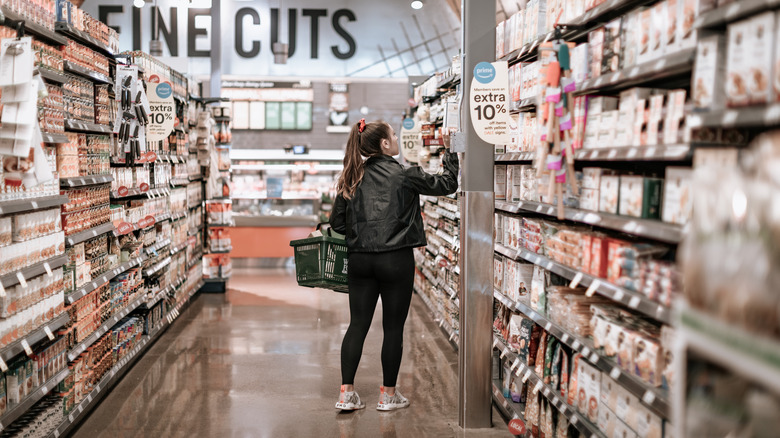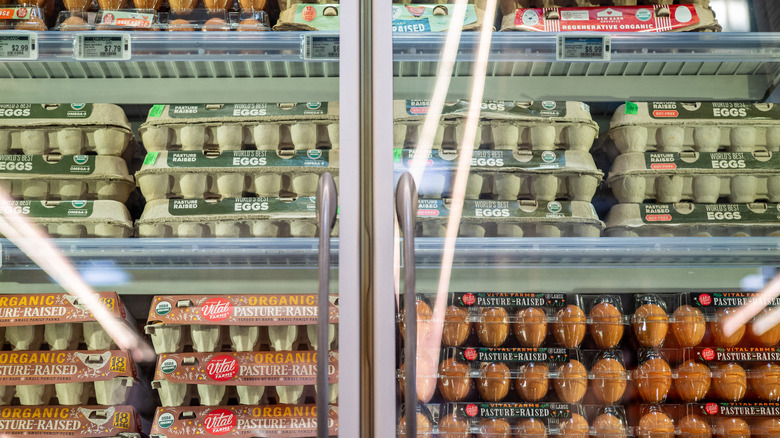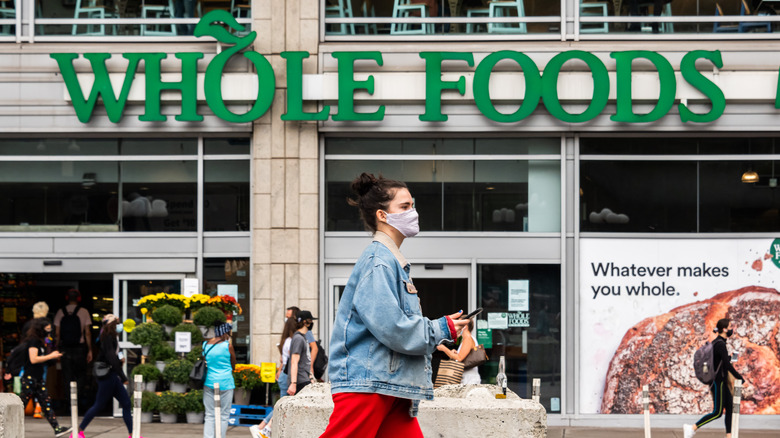The Whole Foods Grocery Items And Products That Get Shoplifted Most Often
By now, almost everyone has felt the pinch of food inflation, which reached a nearly 40-year high in 2022. Even food banks are feeling the effects, reports NPR, experiencing long lines and sometimes turning people away. What you might not know, though, is that shoplifting has increased in tandem with soaring retail prices, according to the U.S. Department of Justice, and it seems as though some people are increasingly turning to theft to make up for the shortfall between low wages and high food prices.
Shoplifting has always been a problem in retail; however, supermarkets, in particular, have seen a significant rise in theft in the past few years. The types of stolen goods are raising eyebrows, according to the Washington Post. Instead of luxury items like pricey steaks or expensive cheese, most of the groceries stolen lately are things like bread and pasta, eggs, and baby formula, which have all experienced sometimes double-digit price increases due to shortages, supply chain issues, and possibly price gouging.
Grocery stores with self-checkouts are hit particularly hard, as Agmis reports that nine out of 10 reported shoplifting incidents occurred using unmanned registers. Maybe it's not surprising that one of the grocery store chains with some of the highest prices — that also employs several self-checkouts — is having a particularly tough time with shoplifting: Whole Foods.
What's getting stolen?
Often dubbed "whole paycheck," it's no secret that the carefully curated stacks of colorful produce and coolers filled with fancy cheese at Whole Foods are costly. The hot bar and salad bar can be expensive at $11.99 a pound, according to Cheapism, and a small paper box holds around 1.5 pounds of mashed potatoes, which will cost you almost $18.
You may think it's primarily those boxes of pricey potatoes that are walking out the door, but much like the national trend at other grocery stores, the foods most often stolen there are also primarily everyday items, according to Elizabeth, a Whole Foods worker from Michigan who recently spilled some secrets to Bon Appetit.
"A lot of times, I'll see staples like peanut butter and jelly or bread. Tuna's a big one. Which to me, if you're stealing tuna, you really need to eat," Elizabeth said, adding that she feels a lot of empathy for people who need food. "It's one thing when someone steals some Dior perfume. But if I see someone stealing a dozen eggs, I just choose to look the other way."
Company culture
However, it's not just the high prices that spur people to steal from Jeff Bezos' chain of grocery stores. Like Elizabeth choosing to turn a blind eye, many other workers report on Reddit that they see people stealing all the time but don't report it. Often what is getting stolen seems to be food to survive, and employees feel the company can afford the loss. This is a sentiment echoed by the people themselves who are stealing.
"I don't feel much guilt about it," a woman identified only as Alex said to the Washington Post. "It's been very frustrating to be part of a class of people who is losing so much right now. And then to have another class who is profiting from the pandemic — well, let's just say I don't feel too bad about taking $15 or $20 of stuff from Whole Foods when Jeff Bezos is the richest man on Earth."
Unfortunately, casual theft only creates higher grocery prices down the road, according to the U.S. Chamber of Commerce. Often considered a victimless crime, shoplifting actually punishes all shoppers with as much as 3-5% increases in prices, according to WBRC, which, when added to already record-high costs, can compound the problem of expensive food.


